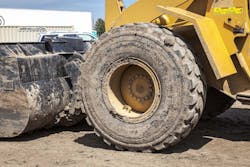4 Tips for Off-Road Tire Maintenance
Unlike on-highway tires, when an off-road tire fails, there isn’t the luxury of simply pulling off the road and popping on a spare.
Proper tire care can extend the life and enhance the productivity of heavy equipment, saving time and money in the long run.
May-RHI and May Heavy Equipment, a dealer network in the southeast representing the Bell, Hyundai, and BOMAG brands, among others, has some helpful tips for maintaining off-road tires.
Inspection and cleaning
Be sure to check for wear and tear that looks abnormal before and after each time you use the equipment. When checking at the end of the day, clean the tires to remove any mud and dirt, which can often show off hidden debris.
Removing debris the same day it appears can help lessen its impact and stop it from penetrating deeper into the tire. If you do find debris that has caused excess tearing of the tire, consider heavy equipment repair or replacing your heavy equipment tires to prevent an expensive tire failure in the middle of a job.
Proper inflation
As with any machinery that sits on tires, make sure the tires are inflated to the proper pressure as per the manufacturer instructions. Underinflated tires can shorten the lifespan of the tread and also increase fuel consumption, while over-inflation can cause impact cuts in the tires.
Tire monitoring
It can make sense to invest in a tire pressure monitoring system to automatically check tire pressure, saving you the time and labor costs for your employees. If a tire seems to constantly need to be filled with more air, it may be time to replace the tires.
Proper operation
How your heavy machinery is used can also have an impact on the wear and tear on the tires, and, by extension, how long they will last until you need to replace them. Encourage good operating habits in your heavy equipment, such as slowing down for potholes, avoiding jackrabbit starts or hard braking, and slowing down for turns.
As with other wear items, it can be tempting to attempt to use the tires as long as possible, even until they have reached the end of their useful life. While this can save money at times, it can also backfire, especially if you wait too long and experience a tire blowout or failure at the worst time.
A proactive approach of replacing your heavy equipment tires before they fail can help save downtime and keep your efficiency at high levels.
Source: May-RHI, May Heavy Equipment
